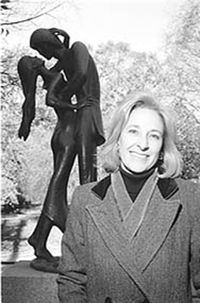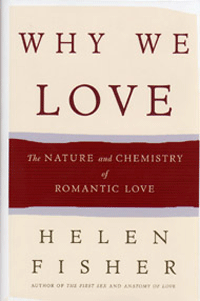The Chemistry of Love
Air Date: Week of February 8, 2008

Toy Love (Photo: Flickr/Capt Kodak)
Research shows that when people talk about relationship chemistry they really are talking about chemicals. Steve Curwood talks with Helen Fisher of Rutgers University to find the science behind love at first sight and happily ever after.
Transcript
GELLERMAN: Now from the sacred to the secular. For true believers and those who just believe in amore—St. Valentine’s Day is here, a day beloved by florists, greeting card companies and of course - those smitten by Cupid’s arrows.
But maybe it’s less archery than chemistry, as Living on Earth’s Steve Curwood learned when he spoke with Rutgers anthropologist Helen Fisher. She’s the author of a book on the chemistry of love.
CURWOOD: You call your book "Why We Love." Well, you might as well ask why do we exist? But, you know, it turns out from your research that this is more than just a philosophical question; it's also a scientific one. Tell me please about your research on this topic.
FISHER: I have a theory that we've evolved three distinctly different brain systems for mating and reproduction. The sex-drive being one, that craving for sexual gratification. The second is romantic love, that obsession, the craving, the ecstasy, the focused attention, the motivation to win a particular mating partner; that early, intense romantic love. And the third brain system is attachment, that sense of calm and security that you can feel with a long-term partner.

Helen Fisher (Courtesy of Helen Fisher)
CURWOOD: So, an MRI, a scanner. Now this is what, nuclear magnetic resonance? You can see what goes on in someone's head?
FISHER: Yeah. What happens in magnetic resonance imaging is that each brain region sucks up blood as it is working, because it needs the glucose and the oxygen from the blood. And so with this scanner you can see which brain regions are sucking up the blood, which ones are working. And then if you know which region is working – and, in fact, which cells in which region are working, and you know what those cells do for a living, then you can tell what's going on.
What we did is we put – I and my colleagues – put 32 people who were madly in love into this brain scanner. Seventeen who were madly in love and their love was accepted, they were happily in love; and 15 who were, had just been dumped, they had just been rejected in love. But both groups were intensely in love.
CURWOOD: So, you're looking at the images of the brain of these people madly in love. These certain areas are stimulated. What does this mean chemically?
FISHER: I had hypothesized that we would find evidence for elevated activity of the dopamine system and the norepinephrine system. These are natural stimulants in the brain; they give you feelings of elation, giddiness, euphoria, focused attention, motivation, heightened energy, sleeplessness, loss of appetite. These are basic characteristics of romantic love. So I thought we would also find low activity of serotonin because low activity of serotonin is associated with obsessive compulsive behaviors, and certainly the main characteristic of romantic love is you can't stop thinking about this individual. It is an obsession. So that was my hypothesis as I went in.

"Why We Love: The Nature of Chemistry and Romantic Love" (Courtesy of Helen Fisher)
CURWOOD: So romance is as important as eating? drinking? breathing?
FISHER: Well, it can be stronger than all of those because some people give up all that in order to win somebody or get out of life when they don't win somebody. Most of us don't though, of course, and eating and drinking is extremely important. I mean, you've got to survive. But, you know what? I mean, I think that romantic love evolved for a very fundamental reason.
CURWOOD: Okay.
FISHER: I think it evolved to enable us to focus our mating energy on just one individual at a time, thereby conserving mating time and energy and starting the most important thing we'll do with our lives, which is forming a pair bond and raising, creating a child. I think the sex drive evolved to get you out there looking for a whole range of partners. I mean, you can have sex with somebody you're not in love with. And I think that attachment, that third brain system, that third drive, evolved to enable us to tolerate this individual, at least long enough to rear a child together.
So I think these three different drives – the sex drive, romantic love, and attachment – all are operating in all kinds of combinations to direct our reproductive lives. And you asked me, is this more important than eating and drinking? Sure. It is.

(Flickr/Capt Kodak)
FISHER: Right.
CURWOOD: What about the sex drive? What are the chemicals there? Are they different from romance chemicals?
FISHER: The main chemical of the sex drive is testosterone, in both men and women. In fact, you know, you inject testosterone in any kind of animal and sex drive goes up. And the brain system is different, too. I mean, there's at least five brain scanning studies of the sex drive, and the various brain regions involved are – they overlap, but they're different from those regions associated with romantic love. So there's two different systems. But they interact, and that's what's so interesting to me.
For example, you know, when you fall in love with somebody, suddenly that person becomes enormously sexually attractive to you. Three weeks ago it was just a nice, another nice person at the office or in your social circle or at the gym. But suddenly everything they do becomes attractive to you. And I think that it is in part because elevated activity of the dopamine circuits associated with romantic love trigger testosterone and trigger the sex drive. So this is why it is that you suddenly become almost, you know, totally fixated sexually on somebody who you're in love with.
What I find most remarkable about these three drives – the sex drive, romantic love, and attachment – is that they're often unconnected. You can feel a powerful sense of attachment to a long-term partner while you feel intense romantic love for somebody else, while you feel this sex drive for a whole range of people. So this is what gets the human animal in so much trouble.
CURWOOD: I bet. Now, let's go back to lust, or the sex drive, and romance. You say that romance can kindle the sex drive. What about the other way around? Can lust lead to romance?
FISHER: Not always, of course. You know, most liberated adults have copulated with somebody who they never fell in love with. In fact, they would have liked to have fallen in love with them and couldn't do it. But it certainly can happen, and it can happen I think in part because with orgasm there's a spike of dopamine – it just shoots up and shoots down again. And that I think can help change the threshold for your ability to fall in love and just turn you over that edge. Also with orgasm you get a real flood in the brain of oxytocin and vasopressin, and these are the chemicals associated with attachment.
So, casual sex isn't always that casual. As a matter of fact I think women are more vulnerable than men are because, as it turns out, seminal fluid has in it all the chemicals in it for the sex drive, the testosterone and estrogen; oxytocin and vasopressin, associated with attachment; and dopamine and norepinephrine, associated with romantic love. So a man is actually doing some chemical finagling when he deposits his sperm. So, you know, casual sex can be casual, but generally it's not.
CURWOOD: Now, you also said that you looked at people who had just been jilted or dumped or crushed.
FISHER: Right.
CURWOOD: What happened in their brains?
FISHER: Well, first of all, Steve, I want to tell you how hard that was to do. You know, I interviewed all these people before I put them in the machine, but people who've just been dumped are in horrible shape. I mean, there were times when I had to go step into a dark room and collect myself and then go back and talk to them. Because some of these were furious, some of them were almost paranoid, some of them were...they were deeply depressed. I mean, romantic rejection is no joke.
And, so, what I did – they did the same experiment. You know, they would look at a photograph of their sweetheart and they would also look at a neutral photograph. We found a lot of things, but among the things that we found is we found activity in a brain region, the insular cortex, where other experiments have shown that this particular region is associated with physical pain in the skin and muscles. Not just psychological pain when you're rejected, but physical pain.
We also found activity in a brain region called the nucleus accumbens. It's a brain region, this particular part of the nucleus accumbens is associated with risking, taking big risks. Actually gambling, gambling for money. Taking big risks for big gains and big losses. And, of course, that's what you do when you've been rejected, you're just willing to do just about anything to win this person back.
And then we also found activity in a brain region near the front of the brain called the lateral orbital frontal cortex. And this brain region, this particular part of the cortex, is associated with three things. Obsessive and compulsive behaviors, and of course you obsessively think about this person. With controlling anger, and that's one thing that happens when you get dumped, you get angry, most people do.
And last but not least, this is a brain region associated with what scientists call a "theory of mind." And what theory of mind is is when people do it, probably much more than other animals, projecting yourself into another person's shoes and thinking, 'What is he thinking about? What is he doing? What is he planning? He's thinking about this or that.' That's theory of mind, and that's what happens when you get rejected. You feel physical pain, you're willing to take huge risks, you're constantly wondering what this other person is thinking, you're obsessively thinking about them and you're trying to control your anger.
CURWOOD: What is the secret of making love last? I mean, can you tell us what you've found about this?
FISHER: I want to say, first of all, that there's very nice data that in long-term attachments you can make love last. That, indeed, if it's a very good relationship there often is a continual thread of romantic love in the relationship as well as deep attachment to the person. You'll feel the romantic love when you're on a vacation, when suddenly you go out on a date with your husband or wife, when something fun happens, when he cracks a joke, when he's wearing a beautiful suit, etc., etc. It can come back.
But, anyway, one of the ways to sustain romantic love in a long-term marriage is to do novel, exciting, slightly dangerous things together. Because novelty drives up the activity of dopamine in the brain. This is why vacations can be so exciting. Just doing something new.
CURWOOD: Helen Fisher's book is called "Why We Love: The Nature and Chemistry of Romantic Love." Thank you so much, Helen Fisher.
FISHER: Thank you.
GELLERMAN: Our interview was conducted by Living on Earth’s Steve Curwood.
Links
“So what, really, is this thing called love” by Lauren Slater, Feb. 2006 National Geographic
Living on Earth wants to hear from you!
Living on Earth
62 Calef Highway, Suite 212
Lee, NH 03861
Telephone: 617-287-4121
E-mail: comments@loe.org
Newsletter [Click here]
Donate to Living on Earth!
Living on Earth is an independent media program and relies entirely on contributions from listeners and institutions supporting public service. Please donate now to preserve an independent environmental voice.
NewsletterLiving on Earth offers a weekly delivery of the show's rundown to your mailbox. Sign up for our newsletter today!
 Sailors For The Sea: Be the change you want to sea.
Sailors For The Sea: Be the change you want to sea.
 The Grantham Foundation for the Protection of the Environment: Committed to protecting and improving the health of the global environment.
The Grantham Foundation for the Protection of the Environment: Committed to protecting and improving the health of the global environment.
 Contribute to Living on Earth and receive, as our gift to you, an archival print of one of Mark Seth Lender's extraordinary wildlife photographs. Follow the link to see Mark's current collection of photographs.
Contribute to Living on Earth and receive, as our gift to you, an archival print of one of Mark Seth Lender's extraordinary wildlife photographs. Follow the link to see Mark's current collection of photographs.
 Buy a signed copy of Mark Seth Lender's book Smeagull the Seagull & support Living on Earth
Buy a signed copy of Mark Seth Lender's book Smeagull the Seagull & support Living on Earth

